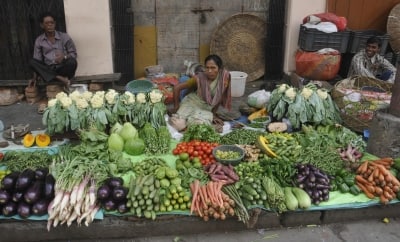

India's food price surge set to be short term
Food inflation in India is likely to ease in the next couple of months as supplies of many crops including tomatoes and potatoes—two essential ingredients in Indian kitchens expand. Fresh produces have already started to hit the Indian markets, sources said.
India’s inflation based on the consumer price index spiked to 7.44 per cent in July compared with 4.87 per cent in June– the highest since 7.79 per cent recorded in April 2022. The surge in CPI was driven by food prices.
India, in a bid to reduce soaring food prices, has started imports of several key food items including tomatoes, potatoes and pulses from overseas markets.
Farmers organisations opine that the price surge for crops is temporary.
“Fresh crops are expected to arrive around September. The price hike of essential food items is a temporary one,” Anil Ghanwat, senior leader of Shetkari Sangathana, a Maharashtra based farmers union, however, told India Narrative.
Ghanwat added that the price rise of food items is a result of speculation.
The total sown area during the Kharif season this year stands at 733.42 lakh hectare compared to 725 lakh hectare last year. While sowing area of rice, maize and millets have increased compared to last year, it is a tad lower for pulses. According to official data released last month, the sowing of pulses was spread over an area of 85.85 lakh hectare, lower than 95.22 lakh hectare last year.
In a bid to control prices in the domestic markets, India, the largest exporter of rice, has also halted exports of the grain.
Meanwhile, Prime Minister Narendra Modi earlier said that India is keeping a close watch on prices and promised to take all necessary steps to bring down prices.
For the first time, India has resorted to importing tomatoes from Nepal. The move has come as a boon for the farmers in the Himalayan nation. A large number of Nepalese farmers growing tomatoes, have been able to realise better prices for their crop since India opened up imports of this key kitchen ingredient.
“With the Indian market opening for Nepal’s tomatoes, farmers here received as much as NPR 140 per kg from around NPR 25-30 per kg during the same time last year,” Prakash Bhandari, vice-chairperson of Kapurkot Rural Municipality, a local government body told India Narrative.
Experts opine that India should consider a proposal to continue imports of key agro products from neighbouring countries– a move that will bolster New Delhi’s role as a regional power. While Nepal’s tomato production is estimated at more than 430,000 tonnes annually, the domestic demand is far less.
However, India’s move to import tomatoes will not be long term.
Navita Srikant, anti corruption and forensic advisor who is also an expert on Nepal affairs pointed out that Nepal raised requests for market access and relaxation in quarantine standards for 16 Agricultural Products during PM Modi’s historic visit to Nepal back in 2014. However, high level visits and review meetings didn’t change conditions.
“The recent issue of relaxation of quarantine measures in facilitating tomato export to India is great news but there is concern over its sustainability,” Srikant said.
While Nepalese farmers are hoping that India continues to import tomatoes, the supplies of tomatoes to New Delhi has resulted in shortage in the domestic market.
Earlier Finance Minister Nirmala Sitharaman said that the government will import Tur dal (split pigeon pea) from Mozambique and Myanmar. Though India has sufficient stock of moong dal (green gram), the government has started to take steps to ensure that the distribution of the same is even to rule out shortages. Sitharaman added that the government will also look into sourcing masoor dal from outside to add to the reserves.
India has been importing potatoes from Bhutan as well. The import exemption which was to end on June 30 has now been extended upto June 2024 by the Director General of Foreign Trade. The move allows imports of potatoes from Bhutan without any license.
“If India revises the stringent conditions again, it will be seen as India’s hegemony to relax when domestic demand soared and not a policy decision for shared progress. We have to avoid these jerks of excitement and work jointly for a long term view on Nepal-India economic relations,” Srikant said.
But amid global uncertainties, India is keen to control food supplies for its domestic markets.
“For India as it is for any other country, food security is key but it will also try to keep food supplies within its control to avoid any shocks. So, it is no surprise that the imports of food items will be temporary,” an analyst said.
Also read: PM Modi pledges resolute steps to fight inflation in his Independence Day address
Union Minister of Ports, Shipping and Waterways, Sarbananda Sonowal, said on Monday that the number…
The inhabitants of Pakistan-occupied Jammu and Kashmir (PoJK) have been enduring years of neglect as…
The Defence Research and Development Organisation (DRDO) is set to make a significant impact at…
Cyprus President Nikos Christodoulides and Prime Minister Narendra Modi on Monday viewed the mountains near…
Cyprus President Nikos Christodoulides said he and Prime Minister Narendra Modi discussed expanding bilateral ties…
Prime Minister Narendra Modi said on Monday that India and Cyprus will develop a strong…